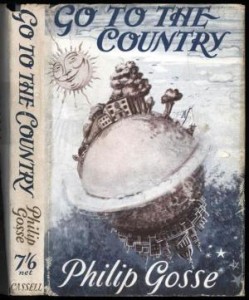 The twentieth century writer Philip Gosse was one of those many British physicians who changed direction into literature. Others, including Oliver Goldsmith, Thomas Smollett, John Keats, Samuel Warren, Robert Bridges, Francis Brett Young, and Somerset Maugham, took up poetry or fiction, but Gosse began with books on pirates. In the collection of essays entitled Go to the Country(1935) we learn that by the time he had given up medicine Gosse had managed to acquire a large country house called ‘Crossbows’ that was spacious enough to have threeguest rooms, which for a bibliophile like him ( his wife also collected) was the ideal environment. Moral: if you are a seriousbook collector make sure that you make enough money to acquire a home large enough to house your collection.
The twentieth century writer Philip Gosse was one of those many British physicians who changed direction into literature. Others, including Oliver Goldsmith, Thomas Smollett, John Keats, Samuel Warren, Robert Bridges, Francis Brett Young, and Somerset Maugham, took up poetry or fiction, but Gosse began with books on pirates. In the collection of essays entitled Go to the Country(1935) we learn that by the time he had given up medicine Gosse had managed to acquire a large country house called ‘Crossbows’ that was spacious enough to have threeguest rooms, which for a bibliophile like him ( his wife also collected) was the ideal environment. Moral: if you are a seriousbook collector make sure that you make enough money to acquire a home large enough to house your collection.
Gosse succeeds in making every less fortunate collector envious by writing glibly about all the space he owned in which to shelve his huge library, and then shocks us by mentioning that while a GP he was momentarily tempted to pocket perhaps the only book in the house of the patient he was visiting—a work entitled Fancy Mice for Pleasure and Profit.Gosse is good on the way books should be housed and displayed –scattered around on tables or on open shelves which allow air to circulate, rather than in caged bookcases, where damp and mildew are encouraged to thrive, although he later rather puzzlingly admits to owning ‘ three tall bookcases with glass fronts ‘ in which his rare association copies were housed.
Gosse’s four works on pirates grew out of his own mania for collecting books on this subject, which luckily for him was not one for which he had any rivals among collectors. Because of this he was able to buy nearly every edition of the two works published by the mysterious eighteenth century chronicler Charles Johnson, and by so doing brought out a Johnson bibliography.
Gosse is also entertaining on the subject of books most suitable for placing beside the beds in guest rooms. He makes three lists of suggestions, seemingly based on no particular criteria, and also reveals that the only book that could be found besides the bed of Lord Montague of Beaulieu was Bradshaw’s Railway Guide. Perceptively, he contradicts the advice of the traveller who feels that ‘only a fool travels abroad without taking a good book or two with him’. Gosse’s response is “ Do you, sir or madam, when you visit your friend take with you your own food…However many books you have in your own house you expect to find different ones , both good and interesting , which you have never read, in the houses of your friends “. Quite.
And on this theme your Jotter would like to end with an observation that when he was writing the Shell Guide to Hertfordshirein the late 1970s he would frequently stay a night at Fawley Bottom Farmhouse, the famous home of John and Myfanwy Piper. As far as I know, Fawley Bottom had only oneguest room, which also served as the Library. Among the many previous guests who had slept in the bed there was Sir Kenneth Clarke whose wedding present to the newly married couple had been a copy of Blake’s Job in case they ever needed to raise money ( luckily they never did) and . who on one morning, according to his memoirs,Another Part of the Wood, woke up to find a dead mouse in the glass of water by his bed..
Not so noteworthy an anecdote , perhaps, compared with the most astonishing feature of this guest room cum library, which was its contents. To your Jotter, then in his late twenties and already an ambitious bibliophile with a taste for the antique, every wall surface seemed covered with the most covetable antiquarian books, most of which were topographical in flavour. Piper, from his teenage years onwards, had assembled this collection for a few shilling a volume. Today, such a library would be beyond the purse of the average bibliophile, especially, the most amazing book(s) in the whole collection—a complete volume ( or volumes ) of Piranesi’s Vedute di Roma.
Unfortunately, after several glass of the Pipers’ favourite Vouvray your Jotter was usually too far gone to appreciate this or any other of the books assembled in that special room.[R.M. Healey]

” the only book that could be found besides the bed of Lord Montague of Beaulieu was Bradshaw’s Railway Guide.”
Presumably not the Lord Montague of Beaulieu who turned the house into a museum of motor cars.
Roger– this is probably the dad. The motor museum lord would have had Kelley’s Blue Book at the very least – and no need for train time tables with a bunch of Bugattis on hand.